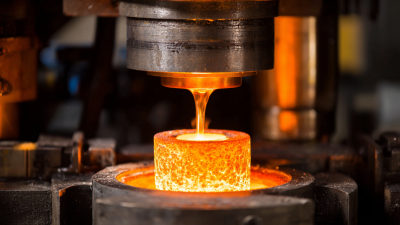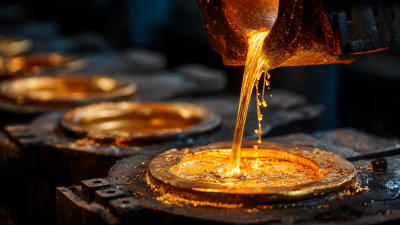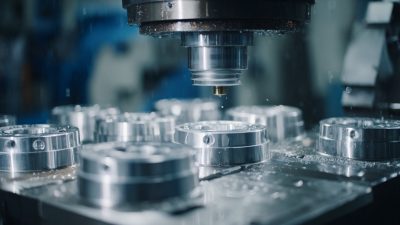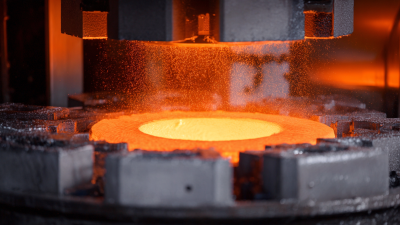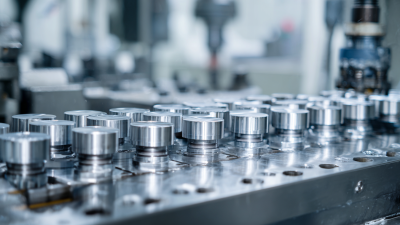The manufacturing landscape is rapidly evolving, and one of the most transformative processes leading this change is Precision Casting. According to a report by Grand View Research, the global precision casting market is expected to reach $36.25 billion by 2025, growing at a compound annual growth rate (CAGR) of 6.9% from 2018 to 2025. This surge is primarily driven by the increasing demand for lightweight and intricately designed components in various industries, including aerospace, automotive, and medical devices.

Industry expert Dr. Emily Chang, a leading authority in metallurgical engineering, emphasizes the significance of precision casting in modern manufacturing: "Precision casting not only enhances product quality but also reduces material waste and production costs." This sentiment underscores the myriad advantages of adopting precision casting techniques, which offer manufacturers the ability to produce highly detailed and intricate parts with exceptional accuracy. As we explore the top five advantages of precision casting, it becomes evident that this innovative approach is pivotal for companies aiming to maintain a competitive edge in their respective markets.
Precision casting has emerged as a pivotal manufacturing technique, offering numerous advantages that enhance production efficiency and product quality. One of the primary benefits is its ability to produce complex shapes with high dimensional accuracy. This precision reduces the need for extensive machining processes, thereby saving both time and cost. Manufacturers can achieve intricate designs that maintain tight tolerances, which is particularly valuable in industries such as aerospace and automotive, where performance and reliability are paramount.
Another key benefit of precision casting is its versatility in material selection. The technique allows for the casting of various metals and alloys, enabling manufacturers to tailor their products to meet specific requirements and characteristics. This adaptability means that components can be designed for optimal strength, weight reduction, and corrosion resistance, ultimately contributing to better performance in real-world applications. Additionally, the reduction in waste and energy consumption during the casting process further enhances sustainability, aligning modern manufacturing solutions with environmentally conscious practices.
Precision casting techniques are revolutionizing modern manufacturing by offering unmatched design flexibility. The ability to produce intricate geometries without extensive machining or additional processes significantly reduces lead times and costs. This is particularly evident in sectors such as automotive and aerospace, where lightweight and strong parts are essential. Recent advancements, such as machine learning-assisted stress and deformation prediction, enhance the reliability of cast components, allowing for more intricate designs that can meet specific performance criteria.
Furthermore, the integration of advanced manufacturing technologies like 3D printing has opened new avenues for precision casting. Customized solutions are now possible, supporting unique applications in fields ranging from jewelry design to functional material development. The 3D printing jewelry market, projected to reach USD 8.5 billion by 2035, exemplifies this trend, showcasing the growing demand for personalized and complex designs. As we continue to explore the synergies between precision casting and emerging technologies, the manufacturing landscape will become increasingly adaptive, paving the way for innovative and sustainable solutions.
This chart illustrates the key advantages of precision casting in modern manufacturing solutions, focusing on enhanced design flexibility. The data showcases the benefits perceived by manufacturers when adopting precision casting techniques.
Precision casting is becoming increasingly essential in modern manufacturing, particularly due to its cost-effectiveness and material efficiency. By using this method, manufacturers can create complex shapes with minimal waste, leading to significant savings in both time and resources. Unlike traditional casting methods that may require extensive machining to achieve desired specifications, precision casting produces parts that are closer to final dimensions, reducing the need for further processing and thus lowering overall production costs.
**Tips:** To maximize cost-effectiveness in precision casting, consider conducting a thorough analysis of your design before production. This ensures that the geometric complexities essential for your application are balanced with material usage, helping to maintain efficiency. Another important aspect is to select the right materials tailored to the precision casting process, allowing for optimal performance without unnecessary excess.
Material efficiency is also enhanced through the use of advanced technologies in precision casting. Innovations like computer-aided design (CAD) and simulations allow manufacturers to refine their processes, reducing defects and further minimizing waste. By adopting these technologies, companies can not only improve quality but also optimize their environmental impact, making precision casting a sustainable choice in modern manufacturing solutions.
**Tips:** Regularly review and update your processes to incorporate the latest technology trends. This not only helps with material efficiency but also keeps your competitive edge sharp in an evolving industry.
Precision casting has emerged as a pivotal method in modern manufacturing, particularly noted for its enhanced dimensional accuracy and superior surface finish in produced components. One of the key advantages of this technique is its ability to produce complex geometries with tight tolerances, which traditional casting methods often struggle to achieve. This accuracy not only reduces the need for extensive post-processing but also minimizes material waste, making the manufacturing process more efficient and cost-effective.
The surface finish achieved through precision casting is another significant benefit. Parts manufactured using this process exhibit smooth surfaces that often require little to no further polishing. This level of quality leads to improved performance characteristics, such as reduced friction and enhanced aesthetic appeal, which are critical in industries ranging from aerospace to automotive. As manufacturers increasingly seek to meet rigorous performance standards and consumer expectations, precision casting stands out as a reliable solution for producing high-quality components that align with modern manufacturing demands.
Precision casting has emerged as a transformative solution in modern manufacturing, particularly in its ability to significantly reduce overall production time. According to industry reports, precision casting can streamline the production process by optimizing material usage and minimizing machining requirements. This is particularly crucial in sectors such as aerospace and automotive, where tight tolerances and complex geometries are essential. The American Foundry Society estimates that precision casting can lead to a reduction in production time by up to 40%, enabling manufacturers to respond swiftly to market demands.
At the recent Aluminum Industry Conference and Expo, industry leaders highlighted the advancements in precision casting technologies that are reshaping production workflows. For instance, the implementation of advanced simulation tools in the casting process allows manufacturers to predict and mitigate defects before production begins. This proactive approach not only cuts down on rework and scrap rates but also shortens lead times. Data from the International Journal of Advanced Manufacturing Technology indicates that integrating precision casting with additive manufacturing techniques can further enhance efficiency, resulting in a reduction of up to 30% in overall cycle time for complex part fabrication.
| Industry | Production Time Reduction (%) | Material Usage Efficiency (%) | Cost Savings ($/unit) | Typical Applications |
|---|---|---|---|---|
| Automotive | 20 | 85 | 50 | Engine components, gearboxes |
| Aerospace | 15 | 90 | 100 | Structural components, turbine parts |
| Medical Devices | 25 | 80 | 75 | Surgical instruments, implants |
| Electronics | 18 | 95 | 30 | Heat sinks, casings |
| Construction | 30 | 78 | 120 | Pipes, fittings |
